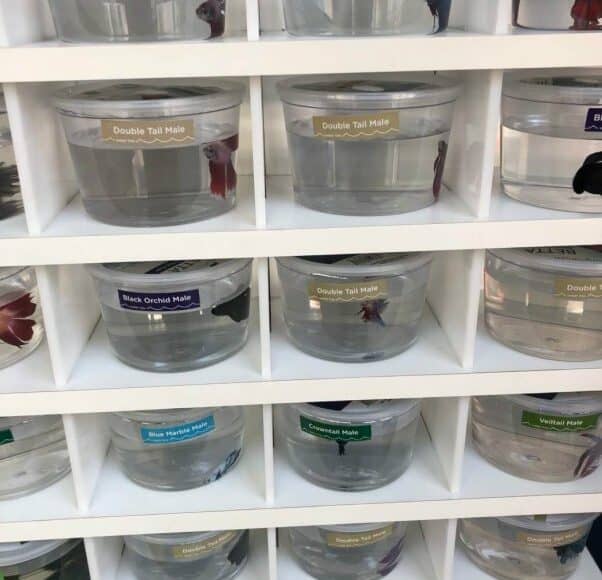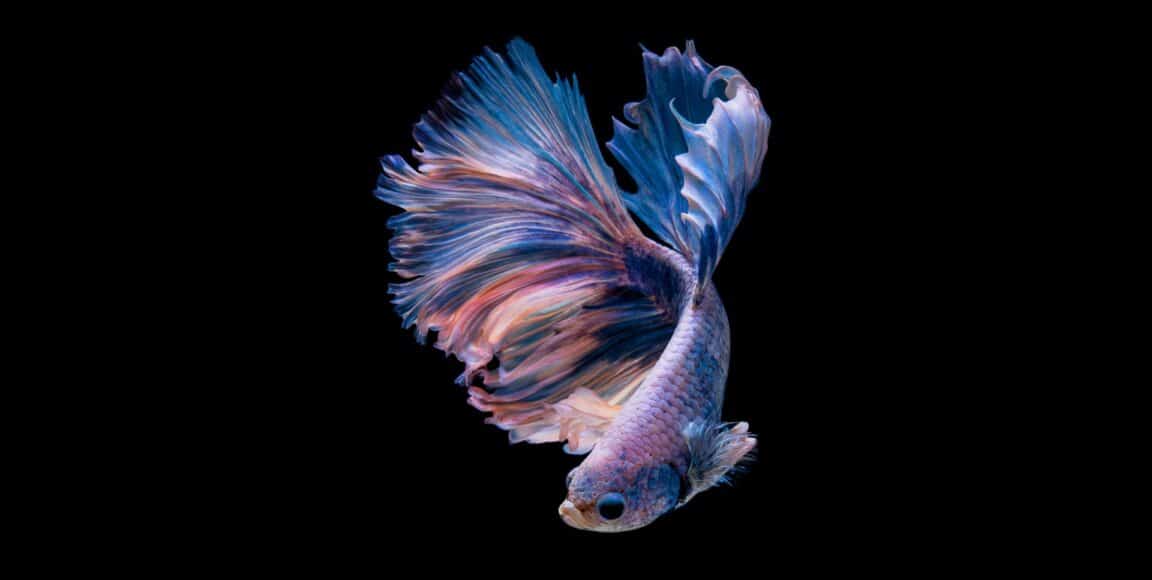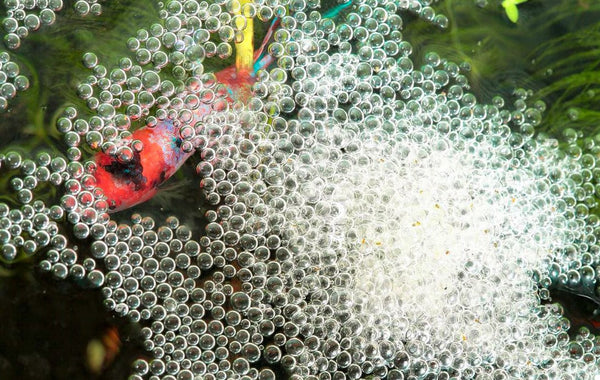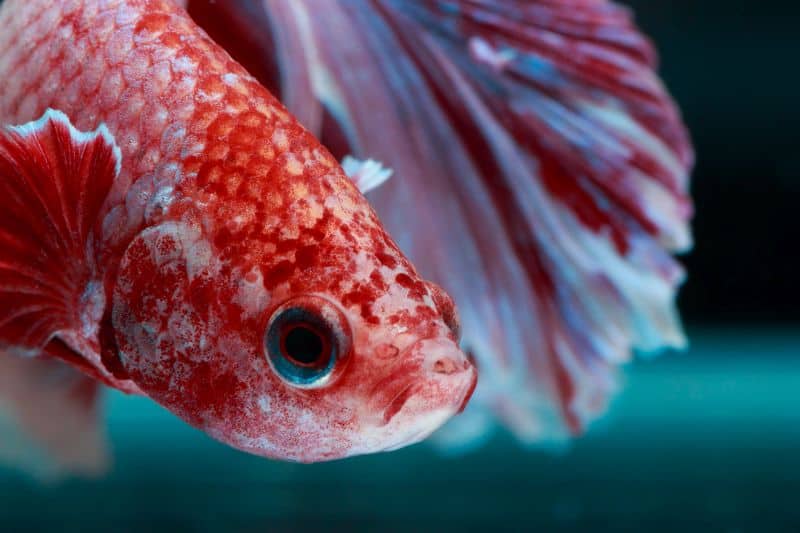Last Updated on February 9, 2023
A healthy betta fish is a happy one!
But how do you know that exactly? What are the criteria and signs for that?
This article covers normal betta fish behavior and how you can provide proper care to make them happy.
If you’re new to betta keeping or have had one for a while but want to ensure your fish is healthy and contented, this post is for you!
Let’s get started.
Table of Contents
Key takeaways
- Happy betta fish have a good appetite and vibrant color. They also swim actively and are alert.
- It’s possible for your betta fish to get depressed. Like us, their serotonin levels decrease, and they become more aggressive.
- To keep your betta fish happy, you must provide the best environment, food, and water condition.
What is the normal betta fish behavior?
Wild betta fish live in Southeast Asia’s warm, shallow waters and flooded rice fields. Their normal routine involves swimming, hunting for food, and hiding from predators.
Bettas naturally thrive in calm and clean environments with plenty of vegetation to hide in.
When kept in captivity, however, bettas are often confined in small tanks with limited movement and resources.

Pet stores and local or online sellers often put bettas in cups or containers like the above.
They do this to conserve space and cut down costs. But because of that, they couldn’t provide proper betta fish care.
Moreover, wild bettas are less territorial since they have more space to explore.
Their aggressiveness is highlighted in captivity as they tend to live together with other fish in closer proximity.
How to tell if your betta fish is happy?
Like other fish, bettas show similar signs when they’re happy and healthy. Here are some of them:
Eating Habits

A healthy betta fish has a good appetite and will show interest in food. They will immediately swim on the surface when you drop food in their tank.
Bettas love meat and require a high-protein diet to thrive. Providing them with nutritious meals will keep your female and male betta happy.
However, the best way to feed bettas is by giving only a tiny amount of food. Something that they can finish within 2 to 3 minutes.
Take note that its stomach’s size is almost the same as its eye. You can use that as a guide for the amount of food you’d give.
Additionally, only feed them twice a day and at eight hours intervals.
Don’t overfeed your betta because this can get food stuck inside the digestive tract, leading to health problems.
Also, avoid feeding chips or crackers to your betta. They are high in sugar and can be damaging to your pet fish.
Level of energy
A healthy betta is alert, curious, and energetic. So when choosing a betta fish from a local store, always make sure that they show these signs.
Tending to sick or lethargic bettas is good, but it will be challenging, especially for newbie owners.
However, you need to know that compared to male bettas; female bettas are calmer and more social.
Male bettas, on the other hand, are more dynamic and aggressive.
Once you buy your betta, you need to monitor their energy levels and ensure that you’re maintaining it.
Observe your betta and look for the following signs:
- Patrolling around the tank as though checking every nook and cranny. This is a good sign of a happy betta fish taking care of its territory.
- Watches you and comes to the water’s surface when you approach the tank. One way to tell your betta is happy is if it doesn’t hide when you are near. Some healthy bettas even go near your hands as you do maintenance in their home.
- React to stimuli, such as seeing their reflection in a mirror or other fish in a different tank. Healthy bettas do gill flaring and fin fanning as a form of defense. This requires energy on their part. So if your pet fish can do it, that means they’re in good condition.
For number three, you can do a daily exercise for three to five minutes. Stick a mirror on their tank or remove any cover to make other fish visible. These actions will trigger betta flaring.
But do not overdo it to avoid stressing your fish out. Setting a timer and alarm will help you build a habit of regularly checking your betta’s behavior.
Color Vibrancy

Having vibrant colors is one of the popular characteristics of betta fish.
They will show this, especially when living in excellent conditions.
A happy betta fish will usually display its best color, from its fins and head to the rest of its body. This can change, however, as they age.
On the other hand, stressed-out bettas will show dulled colors and unhealthy-looking fins.
Stress stripes will also start to appear in your betta fish body. These light or dark vertical lines become visible when your pet fish is anxious or sick.
To accurately check your fish’s color vibrancy, here’s what you can do:
- Check your bettas color and fins regularly.
- Take a picture of them so you can have a reference in the future. If you fail to do this, you can check some photos online.
- Observe their colors at different times of the day, as your betta can look different in various lighting.
Bubble Nests

Bubble nests are made from air bubbles and saliva and are usually created by male bettas to protect eggs.
In the wild, they also use it to attract female bettas.
Their size varies and contains either large and small bubbles or thin strands.
But even without a female betta’s presence, a male betta will create a bubble nest in its tank.
This is a good indicator of a happy betta fish in its home. It means the fish is healthy and has the energy to create bubble nests.
Female bettas do not usually blow bubble nests, but some stories from other fish keepers show otherwise. In comparison, males do this as part of their instinct.
Do not, however, use this as a single indicator that your male betta fish is sick or unhappy.
This is because it may take a few months to happen, and bubble nests could even dissolve without you noticing.
Can my betta fish get depressed?
Yes! like humans and other fish types, a betta is also prone to depression.
You might be shocked that you and your betta share more things in common.
For instance, bettas and humans have emotions, can recognize faces, and show more aggressive responses as their serotonin levels decrease.
In addition, they show the following symptoms:
How to tell if betta fish is depressed?

Loss of appetite
A sick betta constantly ignores its food. They won’t touch their food and will let it fall on the bottom of their tank.
When this happens, check water parameters and perform a water change as needed. Clean water does wonders for fish. If this does not help, check for other signs of disease.
You can also change to other brand of pellets and flakes or feed them live foods to see whether they’re just being picky.
Lethargy
A betta who used to be active then suddenly loses interest in swimming around its tank may suffer from lethargy.
This decrease in activity level likely indicates your betta is not happy.
Again, check water conditions and perform a water change as needed.
You can also examine the temperature of your betta fish tank.
Betta fish are very sensitive to their water condition. And a betta in cold water will show symptoms such as lethargy, lack of appetite, and being more prone to diseases.
If it stays in one area of the tank, then it can mean that its metabolism has slowed down.
If this is the case, use an aquarium heater to provide the correct temperature for your pet betta.
Related: 10 Betta Fish Diseases and Symptoms
How to keep betta fish happy?
Now that you know how to tell if betta is happy and understand the common symptoms of a depressed one, it’s time to take action!
These are some of the best practices for raising a happy betta fish:
Provide the best environment
Water temperature
Betta fish is a tropical fish that comes from Thailand in Southeast Asia.
They have been introduced to the surrounding countries with the same climate as that land of origin.
This is a hint that we should mimic the temperature of the tropical climate for the betta fish’s tank.
You can install an aquarium heater to provide the optimal temperature range between 78 to 80 degrees Fahrenheit or 25 to 27 degrees Celsius.
Tank size
Wild betta fish exist in shallow bodies of water such as rice paddies, streams, irrigation systems, and estuaries.
They have easy access to the water’s surface. Knowing this will help you choose the right tank for your pet fish.
A tank no smaller than 2.5 gallons is okay, but I recommend 5-gallon over it.
The larger volume of water will give more swimming space. It will also prevent sudden fluctuations in water parameters.
Tank mates
Betta fish have earned the name Siamese Fighting Fish for good reason.
Males will be naturally aggressive towards other males, so do not put two male bettas together in a tank.
On the other hand, females are also aggressive but can live with other females in a sorority tank.
This is something for more advanced fish keepers, though. A beginner in the betta fish pet-keeping hobby will succeed more when taking care of just one betta fish.
Equipment
Besides adding heater to maintain the right temperature, you can also add some other things to provide better living conditions for your fish.
Equipment like filters and lighting systems are some of the important ones.
Follow the required water conditions
It is crucial to maintain great water quality, which is a key factor in the health and happiness of your betta fish.
A betta fish will do well in slightly acidic to neutral water pH levels.
Buy a water testing kit to keep track of water parameters such as ammonia, nitrite, nitrate, and pH levels.
Ammonia and nitrite should always be 0 ppm, while nitrate should not be more than 20 ppm.
Besides that, water changes are also essential in keeping your betta healthy and happy.
A good maintenance routine is a partial water change of 20% for a filtered tank once a week.
Avoid 100% water changes because this may alter the water chemistry in your fish tank and cause shock and stress to your betta.
Your betta will surely be happy when water parameters are ideal, and that will show through vibrant colors, healthy appetite, and flowing fins.
Choose the most suitable tank location
Tank location is also a significant factor to consider to keep betta fish happy.
They are territorial and will swim around the tank once in a while to check for intruders.
Instead of hiding or staying at the bottom of the tank, a healthy betta fish will constantly check its territory and notice what goes on outside it.
So putting your betta’s tank in a room you spend a lot of time in will allow your pet to watch your movements. It will also help your betta to be familiar with you.
But when choosing location for your tank, always avoid the area where direct sunlight shines. For instance, putting it close to a window or in an open area.
Bettas are highly sensitive to water temperature fluctuations, and they can get stressed and lethargic because of it.
Provide a variety of food
Betta fish are known to be choosy when it comes to food. They should be fed with flakes or pellet foods specifically for them.
These contain higher protein content than regular fish food. And they need that because they are carnivores.
In the wild, betta fish eat insects that fall into the water, mosquito and other insect larvae, small shrimp, and worms.
If you have access to alternatives like freeze-dried blood worms and brine shrimp, you can provide those to your pet fish from time to time.
Not only will they entice your betta, but they will also trigger your pet’s hunting instinct.
One rule you must never forget, though, is to never overfeed your betta.
They can survive without eating for a day or two, so you don’t have to worry too much about them starving.
What will pose more danger is overfeeding, as they can develop digestive tract issues.
Commonly asked questions
Why does my pet fish get excited when I come home?
This is an excellent indicator that your betta fish has become aware of you.
Your betta fish gets excited because it knows that you are going to give it food and that you will interact with it.
Is gill flaring normal for betta fish?
Gill flaring is a natural response of betta fish to other fish, even with their tank mates.
They are very territorial and will happily patrol their home most of the time.
Your fish can also flare when it sees its reflection on the aquarium glass.
Are bettas happy in those tiny bowls?
No. They will never be happy living in small containers.
They are placed in those tiny bowls for display in the fish shop but need to be transferred to a larger tank.
They do not receive their needs in small spaces, so you shouldn’t use tiny bowls or cups as long-term betta fish homes.
How do I know if my betta fish likes me?
Bettas are intelligent fish and have a good memory. Your pet can show that it’s fond of you in its own way.
Some great signs they show are swimming up to the front glass and eagerly seeking food when you come close.
Related: Are Betta Fish Jumpers?
Final thoughts
That’s it for this article!
As a betta fish owner, it’s essential to understand your fish’s needs and how to keep them healthy.
Pay attention to your betta’s behavior, overall health, appetite, and activity levels. With regular maintenance and quality care, your pet fish can live a long and happy life!
Remember to provide clean and suitable water conditions, a nutritious diet, and plenty of space to swim.
